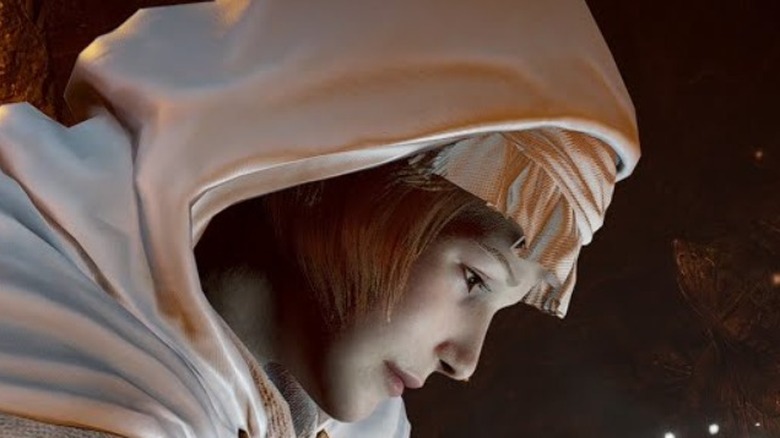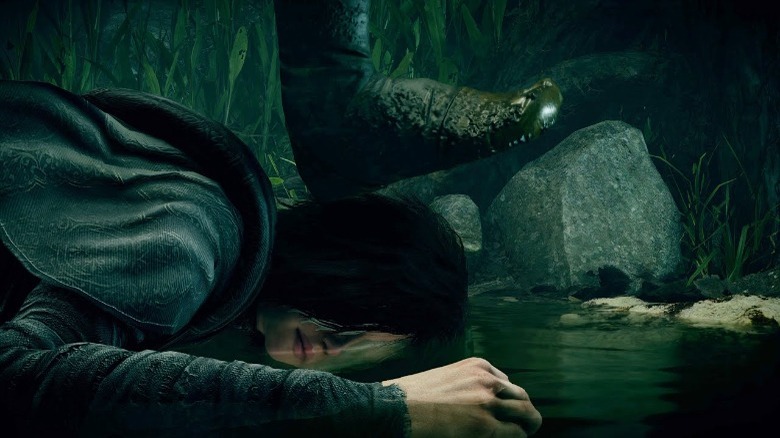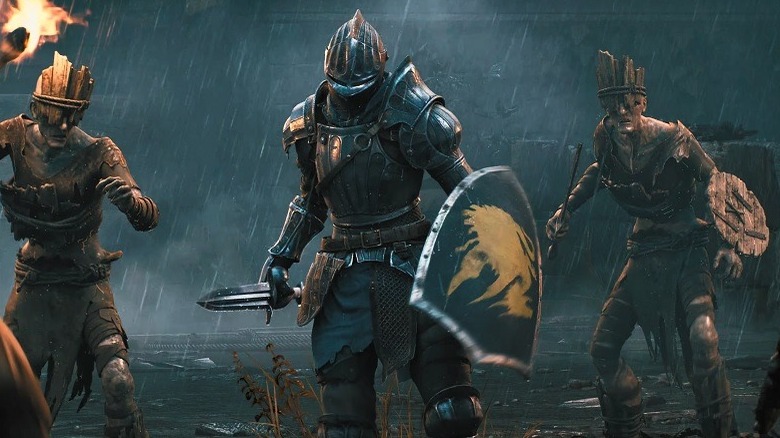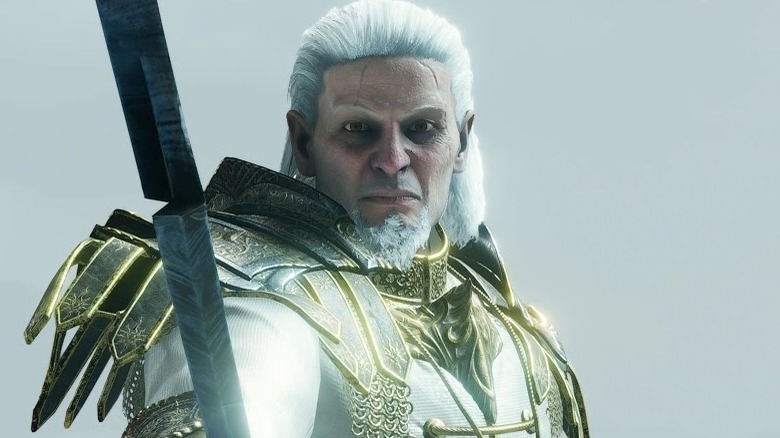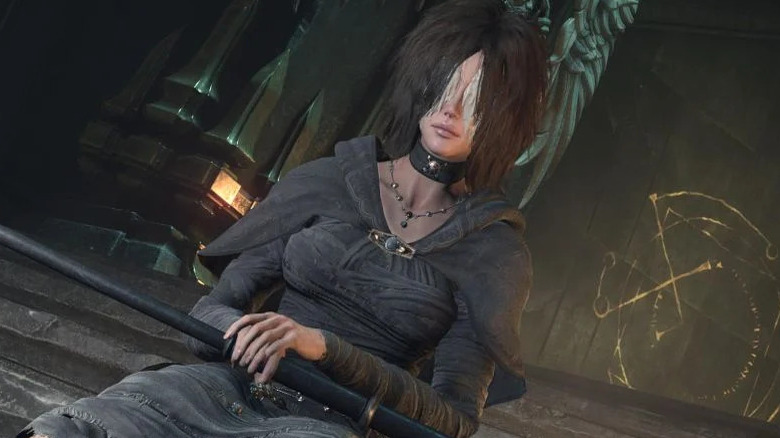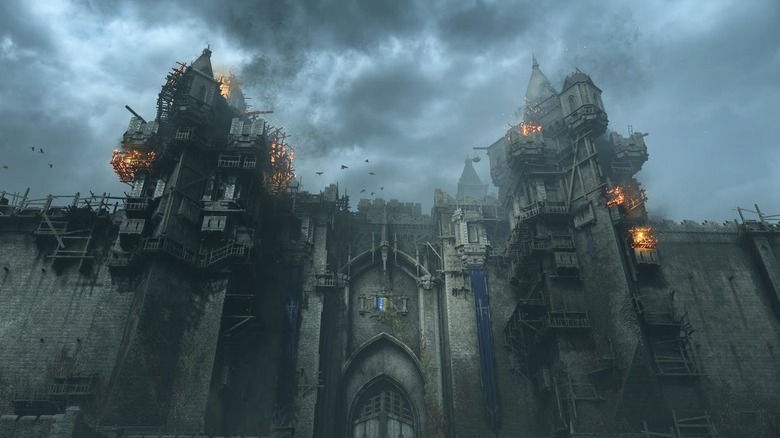Demon's Souls Ending Explained
Known for its difficulty and winding plot, "Demon's Souls" spawned an entire genre of Souls-like adventures. The mythology of "Demon's Souls" is notoriously complex, with most of the mythos doled out in bits and pieces.
Even if you make it through the hours of grueling combat and hidden details, the full meaning of the "Demon's Souls" ending might elude you. Critics gave Bluepoint's reimagining of "Demon's Souls" great reviews when it released for the PlayStation 5. Though the game almost had an easy mode, little could make understanding the lore of the first Souls game simple.
"Demon's Souls" includes two different conclusions — one good and one bad. Both have intense repercussions for the world and the player character. From the fate of Boletaria to the outcome of King Allant's misdeeds, "Demon's Souls" covers a lot of ground in a limited amount of time. Spoilers ahead.
Demon's Souls explores the thin line between good and evil in a bleak world
To understand the ending of "Demon's Souls," it's important to know a bit about the key themes set up throughout the game. While it's tempting to say that "Demon's Souls" and "Dark Souls" have simple plots that give players the binary option of behaving in a good or evil fashion, "Demon's Souls" uses simplicity to highlight the importance of choice.
"Demon's Souls" allows players to forge their own destiny through key narrative moments. In an interview with Eurogamer, director Hidetaka Miyazaki explained that he wanted to create a "game-like game" when he began working on "Demon's Souls," abandoning modern gaming trends for a more "back-to-basics" approach. That distinction made all the difference.
Traditionally, games are either won or lost by players, but "Demon's Souls" demonstrates that sometimes games aren't about victory or defeat. In other words, sometimes the situation is doomed either way. Speaking to IGN, Miyazaki said, "The world is generally a wasteland that is not kind to us. That's just the way I see it." "Demon's Souls" doesn't offer players a bright world, and the ending brings together themes of good and evil — madness and destruction — to create a bleak portrait of morality.
Where does the player character end up?
You ultimately have a decision to make in "Demon's Souls", one that leads down the "good" or "bad" path. This decision drives home some of the biggest themes the game explores, leaving the overarching message in your hands.
As players travel towards the Old One, a voice speaks to them from the beyond, declaring, "You have been chosen by the Old One. Will you seek the everlasting demon souls, or has the Monumental blinded you?" This hints at the ultimate choice: power through the demon souls, or peace through rejecting them. The decision mirrors the game's major theme: the hazy distinction between good and evil. The words of the Old One may make you question the Monumental's words earlier in the story, or inspire you to harness the power of demon's souls for yourself.
Making the choice is simple, but the repercussions are not. Whether you end up with the bad or good ending, the player character must endure trauma along the way.
What happens to King Allant?
King Allant, the greedy being that started the business of collecting demon's souls, has a two part ending in "Demon's Souls." Players get to kill the king twice, and neither instance feels great.
First, you must fight Old King Allant in the Boletarian palace. The Old King looks fresh, despite his name, which should clue players into the fact that something's off. In fact, Old King Allant is a false king, and his true form rests somewhere else entirely. Later, you delve into the Nexus to face the true King Allant, who's little more than a withered corpse years after his misdeeds.
YouTuber Critical Rants pointed out that King Allant serves an interesting case in terms of bosses throughout "Demon's Souls" in that he's something between a monster and a man. King Allant made a demon version of himself to rule while he spent the rest of time inside the Old One waiting for the world to be consumed. The two versions of Allant allow players to see the triumphant, confident side of the king (presumably as he'd appear in life) and also the gross, desiccated corpse he became. This duality further indicates that King Allant is a complicated figure, and one players should pay close attention to in the end game.
What happens to the Maiden?
Like most aspects of "Demon's Souls," the Maiden has two potential fates. Regardless of the decisions the player character makes, the Maiden in Black guides heroes through the Nexus, explaining key details of the world and assisting characters in leveling up skills. However, in the endgame of "Demon's Souls," the Maiden must accompany the player as they journey to meet the Old One. Since the Maiden in Black is the only person who has direct contact with the Old One, she knows when and how you should approach the ancient being.
After an encounter with King Allant and the Old One, players can choose to leave the Maiden with the Old One or kill her. Killing the Maiden triggers a violent death scene, where the protagonist stomps on her head with a sickening crack. Players on Reddit have noted that the cutscene is difficult to watch, especially considering all the Maiden does to help you throughout "Demon's Souls." The Maiden in Black can also have a good ending where she returns to the Nexus after soothing the Old One back to sleep.
What happens to Boletaria?
The kingdom of Boletaria has not had an easy few hundred years. It's host to demon hunters and evil kings, not to mention all the baddies roaming the countryside. Players can choose to save Boletaria at the end of "Demon's Souls" by lulling the Old One back to sleep. Unfortunately, helping the Maiden in Black comes with a price. The "good" ending of "Demon's Souls" means that Boletaria will forget the existence of the soul arts, and all the cool magic players could perform will be lost to time.
The "evil" ending of "Demon's Souls" asks players to be a bit more chaotic. Sure, you have to kill the Maiden in Black, but Boletaria gets to keep its knowledge of soul arts. The Old One recognizes the protagonist's immense power and assumes the player will join it in its quest to plunge Boletaria into a dark fog. Evil sweeps over the land and everything gets worse than it was. For those who paid attention throughout the narrative, it's not clear how Boletaria could get any darker, so you might need to use your imagination to fill in the blanks.
The fate of Boletaria only emphasizes the importance of choice in "Demon's Souls." Players decide whether to side with heroes and save the world or grow their own power to reign supreme. Either way, Boletaria doesn't end up an idyllic place.

